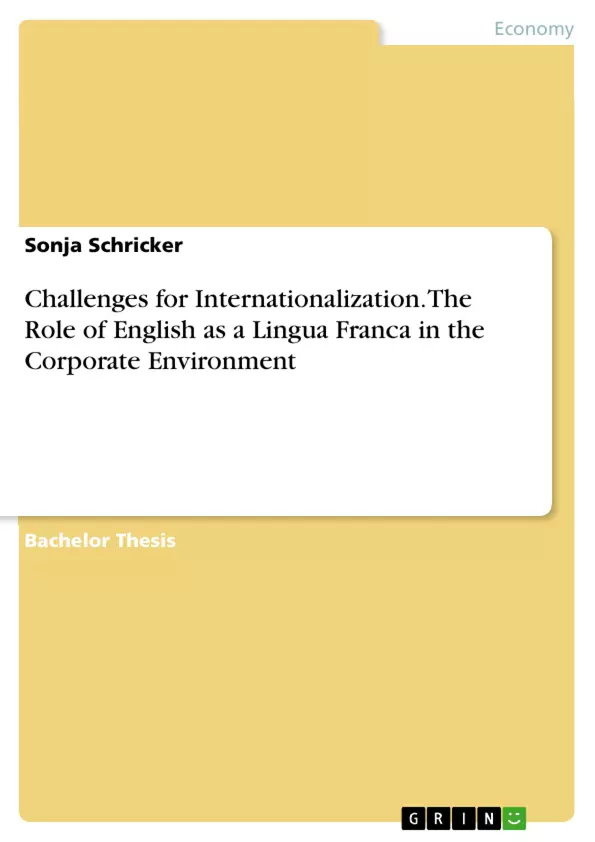This bachelor thesis aims to evaluate the opportunities and risks that the use of English as a common language within an enterprise poses. It addresses the resulting challenges and offers possible ways to approach these. In particular, the need to assess employees’ language proficiency will be examined more in depth: two popular language tests, the TOEIC and the BULATS test, will be introduced and compared in order to appraise their value to company that plans to intensify the corporate use of English. Also, the specific challenges that arise regarding the training of employees will be explained in detail, as well as those in establishing the use of English in the enterprise.
Furthermore, this thesis intends to give insight on the definition of the term “Lingua Franca” in former times as well as its modern usage. To enhance the understandability of why it is English that is chosen as the universal language, the history of the language is briefly described. Finally, from the entirety of investigations, conclusions on the choice of English as company language shall be drawn, and an outlook on the possible future of English as the World Language shall be given.
Inhaltsverzeichnis (Table of Contents)
- Introduction: Rakuten's English policy - a bold but rewarding move
- Definition of the term “Lingua Franca”
- Historical use
- Recent use
- Historical Aspects: The development of English into the world-wide Lingua Franca
- Reasons for English becoming the "World Language"
- Geographic spreading of English proficiency
- Comparison: Recent Statistics vs. 1999 Statistics
- Opportunities of English as a Lingua Franca
- Opportunities within the enterprise itself
- Opportunities for the enterprise in a global context
- Risks of English as a Lingua Franca
- Risks within the enterprise itself
- Risks for the enterprise in a global context
- Resulting Challenges
- Assessment of skills: different types of tests
- TOEIC
- BULATS
- Comparison
- Training of employees
- Establishing the use of English as Lingua Franca
- Assessment of skills: different types of tests
- Conclusions
- Prospects for the future of English as the World Language
Zielsetzung und Themenschwerpunkte (Objectives and Key Themes)
This bachelor thesis aims to assess the opportunities and risks that the use of English as a common language within an enterprise poses. It addresses the resulting challenges and offers possible ways to approach these. The thesis also aims to provide a deeper understanding of the definition of the term “Lingua Franca” in both historical and modern contexts.
- Opportunities and risks of using English as a corporate language
- Challenges associated with implementing English as the lingua franca
- Assessment of language proficiency through various tests
- Training of employees in English language skills
- The historical development of English as a global language
Zusammenfassung der Kapitel (Chapter Summaries)
The introduction of this thesis discusses Rakuten Inc.'s successful implementation of English as the official language within the company. It highlights the challenges and benefits of such a policy.
Chapter 2 defines the term “Lingua Franca” and explores its historical and contemporary uses.
Chapter 3 delves into the historical aspects of English's development into the world-wide lingua franca. It examines the reasons for its rise to prominence and its geographic spread.
Chapter 4 outlines the opportunities of using English as a lingua franca, both within an enterprise and in a global context.
Chapter 5 explores the risks associated with using English as a lingua franca, including those within the enterprise itself and those that may arise in a global context.
Chapter 6 examines the challenges that arise from using English as a lingua franca, including the need to assess employee language proficiency, training employees, and establishing the use of English within the enterprise. It also compares the TOEIC and BULATS language tests.
Schlüsselwörter (Keywords)
This thesis focuses on the role of English as a lingua franca in the corporate environment. It examines the opportunities and risks of using English as a common language within an enterprise, as well as the challenges of assessing employee language proficiency, training employees, and establishing the use of English within the enterprise. Key themes include globalization, internationalization, language skills, communication, corporate culture, and the historical development of English as a global language.
Frequently Asked Questions
What is a "Lingua Franca" in a corporate context?
A Lingua Franca is a common language used for communication between people who do not share a native language, often English in international business.
What are the benefits of English as a company language?
Benefits include easier global collaboration, access to international talent, and streamlined communication across different branches worldwide.
What are the risks of implementing English only?
Risks include potential communication breakdowns, loss of nuances, and feelings of exclusion or stress among employees with lower language proficiency.
What is the difference between TOEIC and BULATS?
TOEIC is a widely recognized test for English in an international workplace, while BULATS (now replaced by Linguaskill) was specifically designed for business language assessment.
How should companies train their employees in English?
Training should be continuous, level-appropriate, and focused on specific professional needs (Business English) rather than just general grammar.
- Citation du texte
- Sonja Schricker (Auteur), 2013, Challenges for Internationalization. The Role of English as a Lingua Franca in the Corporate Environment, Munich, GRIN Verlag, https://www.grin.com/document/343516



